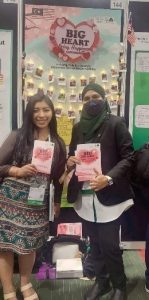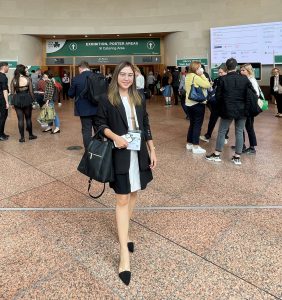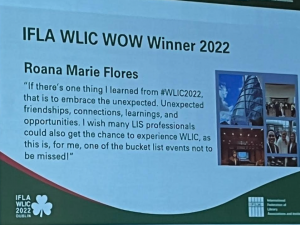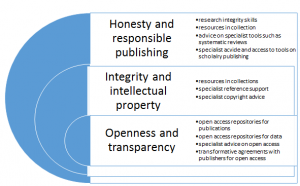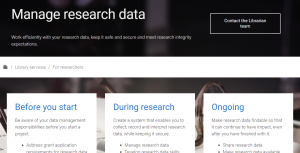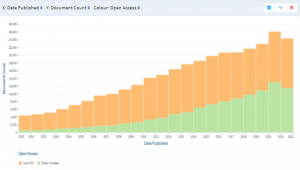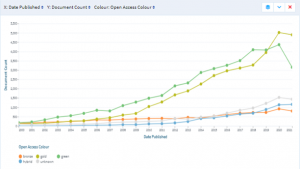Author: Ursula Arning (ZB MED – Information Centre for Life Sciences; TH Köln – University of Applied Sciences)
The goals of Open Access (OA) are to provide unrestricted access to scientific information and increase the visibility of scientific findings, thereby improving and facilitating the sharing of scientific knowledge worldwide. Writing an open access policy is an effective way to enable these goals.
This post offers specific suggestions for writing an effective policy. It also examines how to get the right balance between the requirements of individual institutions and the need to keep the wording of such a policy as standardised as possible, given international cooperation between academics and scientists.
Why is an open access policy important?
One of the primary purposes of an OA policy is to enable organisations to send a signal to the outside world. When it comes to evaluations, research funding applications, and other key activities, a commitment to OA is politically desirable and attracts significant support.
Efforts to advance OA also send a clear signal within the institution, thereby helping to ensure that open science becomes a core part of people’s daily work. Such efforts can include giving employees concrete guidelines on publishing under OA and the measures it uses to encourage it. Therefore, it is helpful to provide the OA policy to new staff as part of their welcome package.
For larger organisations, such as non-university research institutions, a centralised OA policy can be a useful instrument for the institutes that operate under its umbrella; firstly, because it reduces the workload of these individual institutions and, secondly, because it encourages a homogeneous approach to dealing with OA on both an operational and strategic level.
Who should be involved in drafting the OA Policy?
The main target audience of an OA policy comprises the members of the institution who conduct research and publish. However, the policy is also aimed at employees who provide more general support and impetus for OA, such as open access coordinators and/or members of the management team. As discussed above, the OA policy also serves as a position paper that outlines the institution’s attitude and intentions to research funders and political supporters.
All staff (directors, researchers and librarians) must work together for the successful implementation of a policy.
“The successful design, implementation and acceptance of an OA policy requires dialogue among the institution’s members about these goals and their significance. One of the key strategic tasks of the management team is to stimulate and sustain this dialogue and to provide reliable support to the institution’s members as they seek to put the agreed steps into practice.” (WR 2022, p. 59).
What are the key elements of an OA policy?
The content and the wording of an OA policy will depend on the type of organization and the objectives of the policy. The policies can run anywhere between a single page and well over ten pages. Below are the component parts of an OA policy. They are not in priority order nor will every policy include all parts, depending on the requirements of the specific institution.
Background or introductory statement:
An open access policy defines why the institution supports and promotes OA and how it promotes it (e.g. by covering the payment of fees such as APCs). It represents a commitment on the part of the institution, which is why many OA policies start by providing information about the institution.
Definition of OA and/or place of publication:
Ideally, the policy should define what is meant by the term OA, which models of OA the institution supports, and whether it is committed to green OA (self-archiving) and/or gold OA (immediate publishing of the work in an open access journal).
Support for the publishing process:
Most OA policies provide detailed recommendations on how to make members’ publications open access. These recommendations should be accompanied by an advisory service that is highlighted and promoted in the policy. To keep the policy clear and concise, and to ensure it remains valid in the long term, it is preferable to list any detailed step by step publishing workflows in a separate document, such as a set of publishing guidelines.
Determination of licensing terms / Reference to author’s rights:
Licensing terms warrants explicit mention in the OA policy. This serves as a reminder to authors of the importance of preserving the rights to their publications. Based on the principles of OA, institutions are encouraged to specify the use of a particular licence (e.g. a Creative Commons licence; ideally the CC-BY licence, which grants the most freedom).

(Figure 1: CC licences Wikimedia Commons 2013, https://commons.wikimedia.org/wiki/File:Ordering_of_Creative_Commons_licenses_from_most_to_least_permissive.png).
Financing:
State what financial support will be available for OA. This might include information on which fees will be covered or reference to an existing publication fund. It is equally important to point out any options that may be available for acquiring third party funding in order to ensure that all the funding avenues are explored from the start, including external options.
Establishing policy timelines:
The policy should clearly state the deadlines by which each measure will be implemented. In many cases, institutions opt to specify a percentage of publications that they intend to publish under OA by a certain date. It is also advisable to set a deadline by which the institution intends to implement its OA workflows. This serves to highlight the binding nature of the policy.
Assignment of roles and responsibilities:
The policy should clearly define roles and/or responsibilities for each individual measure. In the case of larger institutions, it is important to clearly define what lies within the central office’s sphere of responsibility and what is the responsibility of subordinate bodies and/or individual researchers. In the case of independent institutions, the responsibilities should also be clearly divided between the executive departments (e.g. library or knowledge management department) and the employees. Such a division provides useful clarification and makes it easier to contact the right person in the event of any questions. It is generally better to avoid using personal email addresses to prevent information from becoming outdated.
Reporting/monitoring:
Monitoring the OA measures is another useful way to create a sense of commitment. It provides useful information on which publishing channels the institution uses in the long term while also building up a central record of all its publication output. In Germany, you could provide this data to OpenAPC (INTACT n.d.) in order to help foster the transparency of OA as a whole, as described above.
Further measures:
In the case of institutions that encompass a broad range of disciplines, such as universities, it is often important to point out how publishing behaviour differs between them. This can create a greater sense of cohesion and help accommodate researchers from disciplines in which OA is not as firmly established. It may also be worthwhile to provide relevant research funding policies.
Consider making explicit reference to the commitment to OA as an editor or reviewer which can help boost OA and provide a useful incentive if this commitment is tied to positive connotations such as performance-related funding allocations or positive results in evaluations. Including explicit requests for managers to enable their staff to publish under OA can be equally useful.
When an OA policy includes research data, include any embargo periods that may apply.
Conclusions:
The OA policy can also be a useful starting point for an institution to establish closer ties with its researchers. It is therefore advisable to include a short section at the end, which includes details of who to contact concerning OA.
As the OA movement itself is evolving rapidly; the policy should therefore state the date on which it was drafted and, where applicable, indicate that it is subject to regular updates. Best practice would also be to publish the policy under a CC BY licence, not only to set a good example, but also to make it easier for other institutions to draft their own policy in the spirit of OA.
How should an open access policy be worded?
Policies can be worded with varying degrees of strictness; in the words of Fournier (2017, 21), they may be phrased “more as an appeal, as a recommendation, or as a mandate with a greater or lesser degree of strictness”. The style in which the OA policy is worded will have implications for how it is implemented within the institution. The Sherpa Juliet database, for example, specifies “requires” and “encourages” as categories (Sherpa Juliet n.d.).
A policy, of course, can also employ gradations in phrasing when it comes to expressing whether green OA and gold OA are more of an expectation or an obligation. Even though, from an OA perspective, it is better for a policy to have a “binding” character, there may be local circumstances that justify wording the policy more as an appeal, at least at first.
Conclusion
It is highly advisable for all institutions to draft an OA policy. To make its position clear, the institution drawing up such a policy should bear in mind both the wider community and the institution itself. Such a policy is a clear public statement that the institution believes in the principles of OA and actively supports them. This can be advantageous for funding applications, evaluations and other circumstances. An OA policy also sets out in-house guidelines for staff, especially researchers, on how and where they should publish their work in order to help improve the accessibility of their scientific articles. It does this by specifying certain publishing and advisory services that meet its goals.
The adoption of a clear (binding) position is to be encouraged, even though certain disciplines may be justified in toning down some of the wording to phrase it more as a recommendation than a mandate.
Nonetheless, however much an institution wishes to mould its OA policy to its in-house requirements, it is still important to agree on standards that will facilitate international research cooperation. In the case of researchers who have to collaborate on both national and international levels while also complying with the requirements set by funding bodies, “it can be challenging for authors to accommodate all of these differences while still remaining committed to each of the various sets of guidelines” (Fournier 2017, 23).
OA is constantly evolving, so any OA policy will need to be updated on a regular basis. It is also important to frequently review the OA policy components described above to check that they are still applicable. (Last updated: May 2022)
Bibliography/links:
Fournier, Johannes (2017): Open-Access-Policies und ihre Gestaltung durch Forschungsförderer (Open Access Policies and How They Are Shaped by Research Funders). In: Praxishandbuch Open Access, edited by Konstanze Söllner and Bernhard Mittermaier, Berlin, Boston: De Gruyter Saur, pp. 21-27. https://doi.org/10.1515/9783110494068-003https://www.iab.de/de/informationsservice/open-access-im-iab.aspx (In German; last updated: 19.01.2022).
INTACT (o.J.): Transparent Infrastructure for Article Charges. https://intact-project.org/. (last updated: 22.05.2022)
Sherpa Juliet (o.J.): Research Funders’ Open Access Policies. https://v2.sherpa.ac.uk/juliet/. (last updated: 22.05.2022)
Wissenschaftsrat (Hrsg. 2022): Empfehlungen zur Transformation des wissenschaftlichen Publizierens zu Open Access. DOI: https://doi.org/10.57674/fyrc-vb61 (Stand 22.05.2022).
Illustration:
Wikimedia Commons (2013): Ordering of Creative Commons licenses from most to least permissive.png. https://commons.wikimedia.org/wiki/File:Ordering_of_Creative_Commons_licenses_from_most_to_least_permissive.png
